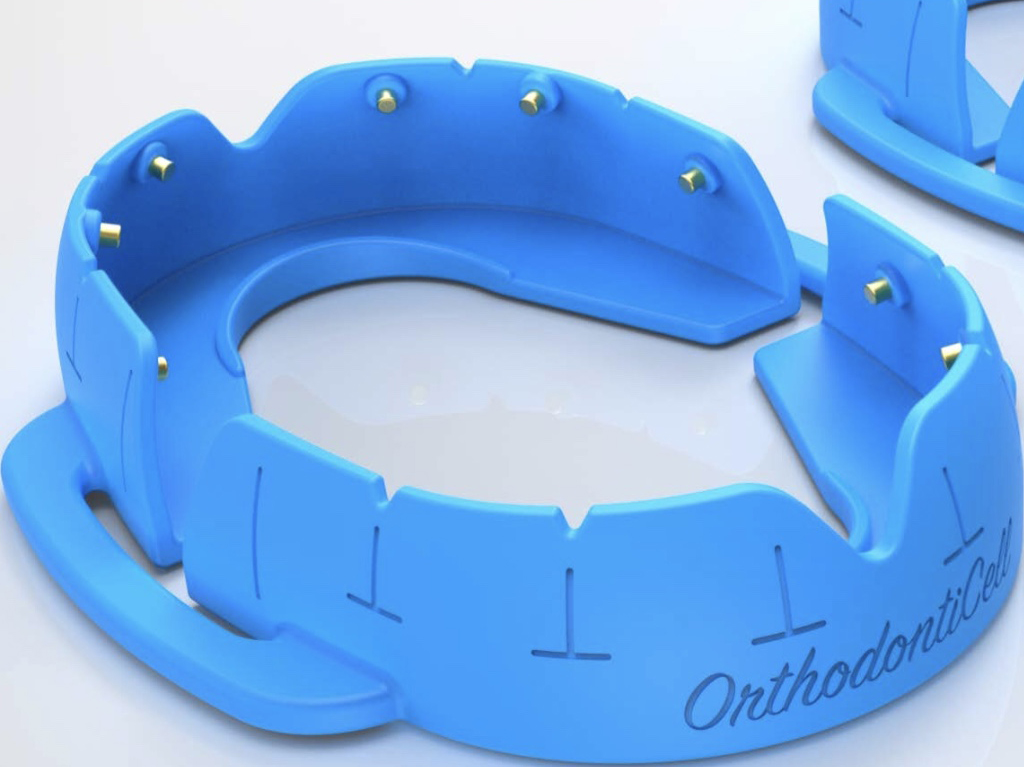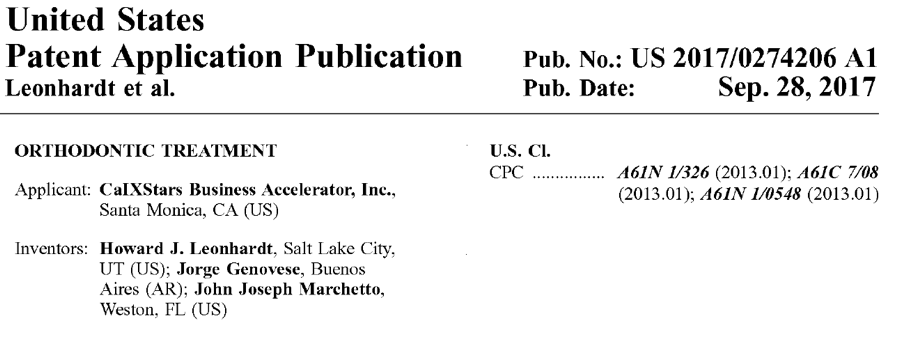
Executive Summary
Vision
Product
OrthodontiCell uses a bioelectric stimulator and mouthpiece (BEST System) to generate signals for accelerated tooth movement by controlling molecules including Receptor Activator of Nuclear Factor Kappa B Ligand (RANKL), Vascular Endothelial Growth Factor (VEGF), and Stem Cell recruitment. For tooth stabilization and retention, Osteoprotegerin (OPG) is the primary molecule along with VEGF and Stem Cell recruitment that is controlled through BEST signaling.
A closer look at the key molecules include:

Problem
RANKL
A powerful biological signal driving osteoclastic formation, function, and survival that supports the bone remodeling process that occurs in orthodontic alignment. Often considered the most important “upstream” regulator for tooth movement, RANKL has been shown to promote osteoclastic activity (bone softening), so when there is increased concentrations, accelerated tooth movement is the result. The OrthodontiCell system is modeled after patient surgical corticotomies of the gum and bone that also results in an increase in the rate of tooth movement. However, it is a surgical procedure with a very significant cost and morbidity. By signaling for RANKL, OrthodontiCell achieves the desired prolonged acceleration in the rate of tooth movement without surgery with only 20 minutes of wear 2 times a week.


Numerous animal studies have demonstrated the effectiveness of RANKL as the key modulator for osteoclast formation. Greater amounts of RANKL during orthodontic tooth movement significantly increases bone turnover (bone softening), resulting in faster tooth movement. Many of the animal studies have shown that the Test Group of mice receiving RANKL injections were also found to have a higher osteoclast count during the first 21 days of injections compared to a Control Group. This initial increase in osteoclast count is one of the major contributing factors to accelerated tooth movement seen in the various studies.
OPG – OPG has a similar but opposite effect of RANKL whereby it promotes the genesis of osteoblasts that generates osteobalstic activity (bone hardening) and subsequent tooth stabilization. Since bioelectric stimulation can increase OPG production, teeth will more quickly become stable following orthodontic treatment. Additionally, OPG decreases bone turnover by acting as a decoy receptor for RANKL, inhibiting osteoclastogenesis (bone softening). Numerous OPG animal injection studies have demonstrated the ability to stabilize teeth after orthodontic movement with minimal relapse, even without any form of retention.
OrthodontiCell
Bio-Electric Tooth Movement Accelerator™
Bio-Electric Teeth Position Stabilizer™
OrthodontiCell’s Tooth Movement Accelerator™ and Stabilizer™ is a bioelectric stimulation mouthpiece that produces very similar amounts of RANKL and OPG in the periodontal tissues that have been used in successful needle injection animal studies. The Tooth Movement Accelerator emits small electric pulses that control expression of signaling molecules such as RANKL and VEGF while attracting cells such as stem cells to become osteoclasts. Conversely, the Teeth Position Stabilizer uses OPG, VEGF and stem cell recruitment to for more rapid stabilization following treatment. Patients using OrthodontiCell’s patented technology will enjoy the following benefits over current orthodontic alignment techniques utilizing braces or aligners:
• Up to 66% faster tooth movement, thereby reducing treatment time by 2/3’s.
• Over 70% reduction in pain associated with tooth alignment.
• More predictable treatment response due to softened bone.
• Long-term tooth alignment stabilization through controlled OPG expression.
• Improved overall results due to enhanced treatment compliance.
• Long-term stability through a reduction of unwanted tooth tipping during movement.
Orthodonitcell is working with Leonhardt Launchpads Utah to conduct further research into the OPG protein to enhance long-term tooth alignment stabilization for the next generation of Orthodonticell’s products.
A video with additional information on the Bio-Electric Tooth Movement Accelerator™ and Bio-Electric Teeth Position Stabilizer™ can be found at: https://vimeo.com/267150484

Market:
• Orthodontics market alone = $11 billion annually
• Worldwide 12 mil patients begin orthodontic treatment annually including 4 mil in the U.S.
• A leading clear dental aligner company has already treated over five mil patients.
• In 2018 alone, 1.3 million patients received clear aligner treatment.
• A market leader in aligners had a market capitalization of over $21 billion in November 2019.
• Since 2018, over $450M of private investment has been made in dental alignment companies.
• One company in this field recently completed an IPO that raised $1.35 billion on a valuation of $9 billion.
Competition:
OrthodontiCell’s proprietary technology can significantly accelerate tooth movement thereby reducing treatment time while also significantly reducing the treatment pain compared to currently available options. Standard braces or aligners rely on mechanical force for orthodontic alignment, requiring an average of 2 years to complete treatment while potentially causing the patient a significant amount of pain. Standard braces also have a significant negative cosmetic appearance for the patient, especially due to the long treatment time periods.
OrthodontiCell’s technology is also the only therapy that accelerates post-alignment stabilization through controlled OPG expression. The only other option requires continuous retainer use to stabilize the final alignment and has allowed for up to 1/3 relapse rate, with the teeth returning toward their original misalignment.
| Orthodonticell | AcceleDent | Micro-osteoperforation | OrthoPulse | |
|---|---|---|---|---|
| Mechanism | Bioelectric signaling to control expression of RANKL, OPG, VEGF, Stem Cells | Small vibrations to enhance tooth movement | Tiny punctures in the gum and bone stimulates inflammatory response | Laser light application |
| Accelerated tooth movement (compared to standard treatment) | Up to 70% (average - 66%) | Up to 30% | 50% | Up to 30% |
| Frequency | 20 minutes, 2 days per week | 20 minutes everyday day | Bimonthly by orthodontist | 10 minutes every day |
| Pain Reduction | 20 minutes, 3 days per week | Inconclusive results | N/A | Inconclusive results |
| Misc | The OPG protein will enhance long-term alignment | Used with other alignment options | Used with other alignment options | Used with other alignment options |
Patents:
Over 13 patent claims have been issued, pending, licensed or optioned for controlling RANKL, VEGF, and OPG protein expression. Additional patents using RANKL and VEGF for accelerating tooth movement and OPG for stabilization have been filed. This patent portfolio includes US 20170274206A1 – Orthodontic Treatment.

Pre-clinical Trials



Clinical Trials
• In a recent 40 patient trial, the space gain in the canine-to-canine region of the lower arch was compared between patients treated with braces, nickel/titanium (NiTi) wires, and a sham mouthpiece (Control Group) to a Test Group that had the same braces, wires and a mouthpiece but received 20 minutes of electrical stimulation 2 times per week for 12 weeks. The results of the human clinical trial are as follows:

• The pain level in these 40 patients was also compared after changing the NiTi wire, using the Visual Analog Scale (VAS). Patients in the Test Group that received electrical stimulation had significantly lower pain levels at 24 and 48 hours after the wire changes compared to patients in the Control Group (*p<0.05). Not only was the pain level in the Test Group lower than the Control Group, but it remained under “15” on the VAS in the 72 hours following the wire change. • Representative cases for the Control Group treated without bioelectric stimulation and the Test Group that received electrical stimulation are shown below. The majority of the patients in the Test Group reached complete alignment with less pain vs. the Control Group.[/et_pb_text][/et_pb_column][et_pb_column type="1_2" _builder_version="4.0.9"][et_pb_image src="https://orthodonticell.com/wp-content/uploads/2019/12/Picture5.png" _builder_version="4.0.9"][/et_pb_image][et_pb_image src="https://orthodonticell.com/wp-content/uploads/2019/12/Picture7.png" _builder_version="4.0.9"][/et_pb_image][/et_pb_column][/et_pb_row][et_pb_row _builder_version="4.0.9"][et_pb_column type="4_4" _builder_version="4.0.9"][et_pb_image src="https://orthodonticell.com/wp-content/uploads/2019/12/testgroup.png" align="center" _builder_version="4.0.9"][/et_pb_image][/et_pb_column][/et_pb_row][/et_pb_section][et_pb_section fb_built="1" _builder_version="3.25.4" background_color="#e5e5e5"][et_pb_row _builder_version="3.25.4"][et_pb_column type="4_4" _builder_version="3.25.4"][et_pb_text _builder_version="3.27.4" header_font="||||||||" header_text_align="center" header_font_size="38px"]
Team
Howard Leonhardt, Co-Founder, Executive Chairman and CEO of BioLeonhardt, is an inventor and serial entrepreneur with over 21 issued U.S. patents and dozens more pending. He developed the leading endovascular stent graft system and first percutaneous heart valve, both of which are now part of Medtronic. He has founded over 30 startups and has numerous successful exits.
Dr. John Marchetto, Co-Founder, President and Chief Medical Officer, received his Doctorate of Dental Medicine and his Orthodontics Certificate at Tufts University School of Dental Medicine. Dr. Marchetto is a member of the American Association of Orthodontists and the American Dental Association, among many others. Dr. Marchetto is on staff at Joe DiMaggio Children’s Hospital Craniofacial Team where they care for children with facial anomalies such as cleft lips and palates.
Dr. Jorge Genovese, Collaborative Researcher, Co-Inventor, is an expert in the research and development of electrical stimulation regeneration technologies. He has led research departments and teams at multiple companies and has been a Research Professor at universities around the world. Dr. Genovese received his doctorate degree from Buenos Aires University.
Additional Team Members:
Dr. Leslie Miller
VP Clinical Affairs
Alex Richardson
CTO & VP of Engineering & Product Development
Brett Burton, Ph.D.
VP Research & Development
Dr. Alonzo Moreno
Senior Advisor, Lab Researcher
Brian Hardy
Director of Marketing

Research Facilities:
BioInnovations Gateway
2500 S State St. #224, Salt Lake City, Utah
Center for Medical Innovation Research Park
417 S Wakara Way Suite 3321, Salt Lake City, Utah
References
Kim, D., Park, Y., Kang, S. The effects of electrical current from a micro-electrical device on tooth movement. The Korean Journal of Orthodontics. 2008 Oct 30: 38(5); 337-346.
Li, C., Chung, C.J., Hwang, C., et al. Local injection of RANKL facilitates tooth movement and alveolar bone remodelling. Oral Diseases. 2019; 25:550-560.
Showkatbakhsh, A., Younessian, F., Dianat, O., et al. Effect of Intra-Canal Direct Current Electric Stimulation on Orthodontic Tooth Movement: An Experimental Study in Canines. Journal of Dental School 2016; 34(3): 157-67.
Spadari, G.S., Zaniboni, E., Vedovello, S.A.S. et al. Electrical stimulation enhances tissue reorganization during orthodontic tooth movement in rats. Clin Oral Invest (2017) 21: 111.
Zaniboni, E., Bagne, L., Camargo, T. et al. Do electrical current and laser therapies improve bone remodeling during an orthodontic treatment with corticotomy? Clin Oral Invest (2019).
TechCrunch. Tech startups want to go inside your mouth. January 27, 2018.
IBISWorld. Orthodontists in the US. December 2018.
USA Today. Goodbye, braces? Invisalign, SmileDirectClub lead teeth-straightening boom.
December 21, 2018.
Bracing For Competition? Cheaper Challengers Enter Invisalign’s $1.5 Billion Market. Forbes. May 2, 2018.
Yahoo! Finance. Align Technology, Inc.
Source: Pitchbook. Companies included SmileDirect Club, Candid Co, Your Smile Direct, Uniform Teeth, Orthly. SmileDirectClub received $380M PE investment in 2018 at a post-money valuation of $3.2B.
Forbes. SmileDirectClub Gets Chilly Reception In Latest Billionaire-Minting IPO. September 11, 2019.